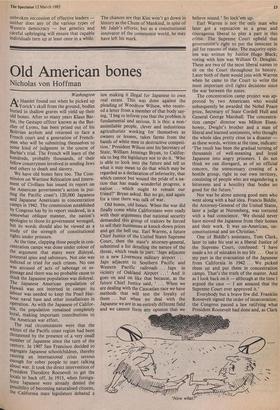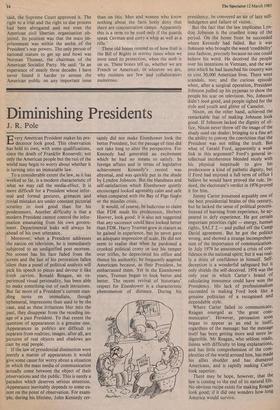Old American bones
Nicholas von Hoffman
Washington AHamlet found out when he picked up Yorick's skull from the ground, bodies buried in shallow graves will yield up their old bones. After so many years Klaus Bar- bie, the Gestapo officer known as the But- cher of Lyons, has been prised out of his Bolivian asylum and returned to face a French court and a generation of French- men who will be submitting themselves to some kind of judgment in the course of Barbie's trial. The French will learn of the hundreds, probably thousands, of their fellow countrymen involved in sending Jews and others to death and slavery.
We have old bones here too. The Com- mission on Wartime Relocation and Intern- ment of Civilians has issued its report on the American government's action in put- ting the Pacific coast's 120,000 Japanese and Japanese Americans in concentration camps in 1942. The commission established by Congress has by its report tendered, in a somewhat oblique manner, the nation's apologies to those its government wronged, but its words should also be viewed as a study of the strength of constitutional rights under pressure.
At the time, clapping these people in con- centration camps was done under colour of the argument that many were disloyal, Potential spies and saboteurs. Not one was indicted or tried for such crimes. No one was accused of acts of sabotage or es- Pionage and there was no probable cause to think the Japanese population was disloyal. The Japanese American population of Hawaii was not interned in camps: its labour was needed to keep the Pearl Har- bour naval base and other installations in operation. As with the Japanese of Califor- nia, the population remained completely loyal, making important contributions to the American war effort.
The real circumstances were that the whites of the Pacific coast region had been threatened by the presence of a very small number of Japanese since the turn of the century. In 1907 San Francisco decided to segregate Japanese schoolchildren, thereby causing an international crisis serious enough for sober people to start talking about war. It took the direct intervention of President Theodore Roosevelt to get the locals to back off. In 1913, when foreign- born Japanese were already denied the Possibility of becoming naturalised citizens, the California state legislature debated a
law making it illegal for Japanese to own real estate. This was done against the pleading of Woodrow Wilson, who receiv- ed a letter from a member of that body say- ing, 'I beg to inform you that the problem is fundamental and serious. It is this: a non-' assimilable people, clever and industrious agriculturists working for themselves as owners or lessees, takes farms from the hands of white men in destructive competi- tion.' President Wilson sent his Secretary of State, William Jennings Bryan, to Califor- nia to beg the legislature not to do it. 'Who is able to look into the future and tell us what it may mean to do that which may be regarded as a declaration of inferiority, that which cannot but wound the pride of a na- tion that has made wonderful progress, a nation ... which ought to remain our friend?' Bryan asked. But no go, and again for a time there was talk of war.
Old bones, old bones. When the war did finally come white Californians were ready with their arguments that national security demanded this group of traitors be forced to sell their businesses at knock-down prices and get the hell out. Earl Warren, a future Chief Justice of the United States Supreme Court, then the state's attorney-general, submitted a list detailing the nature of the threat, which reads in part: `Japs adjacent to a new Livermore military airport ... Japs adjacent to Southern Pacific and Western Pacific railroads ... Japs in vicinity of Oakland Airport ... ' And it goes on and on like that because, as the future Chief Justice said, ... When we are dealing with the Caucasian race we have methods that will test the loyalty of them . .. but when we deal with the Japanese we are in an entirely different field and we cannot form any opinion that we believe sound.' So lock'em up.
Earl Warren is not the only man who later got a reputation as a great and courageous liberal to play a part in this crime. The Supreme Court upheld that government's right to put the innocent in jail for reasons of state. The majority opin- ion was written by Justice Hugo Black; voting with him was William 0. Douglas. These are two of the most liberal names to sit on the Court throughout its history. Later both of them would join with Warren when he came to the Court to write the most important civil rights decisions since the war between the states.
The concentration camp project was ap- proved by two Americans who would subsequently be awarded the Nobel Peace prize, Secretary of State Cordell Hull and General George Marshall. The concentra- tion camps' director was Milton Eisen- hower, Dwight's brother and a man of liberal and learned sentiments, who thought the whole idea pretty close to a disaster as these words, written at the time, indicate: `The result has been the gradual turning of thousands of well-meaning and loyal Japanese into angry prisoners. I do not think we can disregard, as of no official concern, the unnecessary creating of a hostile group, right in our own territory, consisting of people who are engendering a bitterness and a hostility that bodes no good for the future.'
Nor was he alone among good men who went along with a bad idea. Francis Biddle, the Attorney-General of the United States, later a judge at Nuremberg, was tortured with a bad conscience. 'We should never have moved the Japanese from their homes and their work. It was un-American, un- constitutional and un-Christian.'
One of Biddle's assistants, Tom Clark, later to take his seat as a liberal Justice of the Supreme Court, confessed: 'I have made a lot of mistakes in my life . . One is my part in the evacuation of the Japanese from California in 1942 ... We picked them up and put them in concentration camps. That's the truth of the matter. And as I look back on it — although at the time I argued the case — I am amazed that the Supreme Court ever approved it.'
Everybody but a brave few did. Franklin Roosevelt signed the order of incarceration; the Congress passed a law ratifying what President Roosevelt had done and, as Clark said, the Supreme Court approved it. The right to a trial and the right to due process had been abrogated and not even the American civil liberties organisation ob- jected. Its position was that the mass im- prisonment was within the ambit of the President's war powers. The only person of national stature to get up and howl was Norman Thomas, the chairman of the American Socialist Party. He said: 'In an experience of nearly three decades I have never found it harder to arouse the American public on any important issue than on this. Men and women who know nothing about the facts hotly deny that there are concentration camps. Apparently this is a term to be used only if the guards speak German and carry a whip as well as a rifle.'
These old bones remind us of how frail is the Bill of Rights in stormy times when we most need its protection, when the mob is on us. These bones tell us, whether we are French or American, or whoever we are, why resisters are few and collaborators numerous.











































 Previous page
Previous page